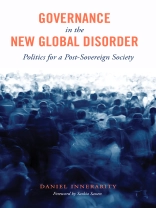When we talk about globalization, we tend to focus on its social and economic benefits. In Governance in the New Global Disorder, the political philosopher Daniel Innerarity considers its unsettling and largely unacknowledged consequences. The ‘opening’ of different societies to new ideas, products, and forms of prosperity has introduced a persistent uncertainty, or disorder, into everyday life. Multinational corporations have weakened sovereignty. We no longer know who is in control or who is responsible. Economies can collapse without sufficient warning, and the effort to rebuild can drag on for years. Piracy is everywhere. Is there any way to balance the interests of state, marketplace, and society in this new construct of power?
Since national economies have become deterritorialized and political interdependencies aggravate our common vulnerabilities, Innerarity contends that there is no other solution except to move toward global governance and a denationalization of justice. Globalization tries to unify the world through technologies, the economy, and cultural products and styles, but it cannot articulate or regulate political and legal equivalents. Everyone faces the same risks to their security, food supply, health, financial stability, and environment, and these risks demand a new global politics of humanity. In her foreword, the sociologist Saskia Sassen isolates the key takeaways from Innerarity’s argument and the solutions they present to growing global tensions.
Tabela de Conteúdo
Foreword, by Saskia Sassen
Introduction: Whose World Is It?
Part I. An Unprotected World
1. The Return of Pirates in the Global Era
2. Humanity Threatened
Part II. The Unfulfilled Promise of Protection
3. Global Fear
4. A Walled World
Part III. Governing, or the Art of Taking Charge
5. The Observation Society
6. From Sovereignty to Responsibility
7. Climatic Justice
8. A Politics of Humanity
Epilogue: Us and Them
References
Index
Sobre o autor
Daniel Innerarity is Ikerbasque Research Professor at the University of the Basque Country and director of the Instituto de Gobernanza Democrática. His books include The Future and Its Enemies: In Defense of Political Hope (2012) and The Democracy of Knowledge (2013).Saskia Sassen is the Robert S. Lynd Professor of Sociology and co-chair of the Committee on Global Thought at Columbia University. She is also the author of the Columbia University Press title Losing Control? Sovereignty in the Age of Globalization (2015).Sandra Kingery is professor of Spanish at Lycoming College and translates prose, poetry, and philosophical and political texts.












